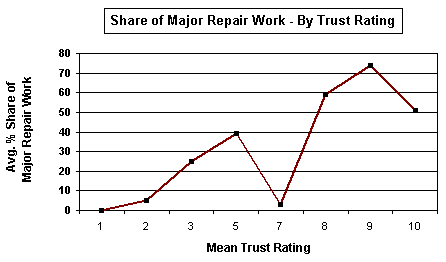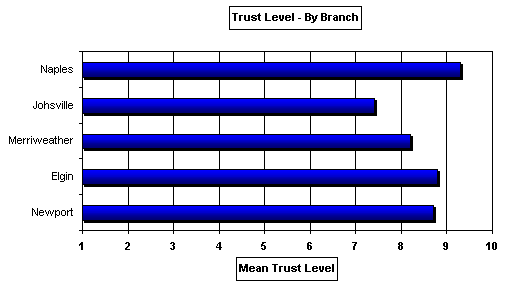|
|
| Home - Industry Article - Dec 06 Issue |
How to Win Customer Trust |
By Lynn Daniel, Founder, The Daniel Group
Do your customers trust your company to act in their best interests? It is a question not often formally asked of customers. The response to this question is assumed. “Customers trust us. Why else would they do business with us?” Based on some of our recent engagements, it is a question you should formally ask your customers. Their responses may surprise you but may also make a difference to your company’s bottom (and top) line.
Trust and Loyalty – What is the Connection
The connection between trust and loyalty is debated by marketing professionals. This paper is not about debating the argument. There are several noteworthy articles that shed light on the question.
The first is from work done by Frederick Reichheld and Earl Sasser (‘Zero Defections: Quality Comes to Services,’ ‘Harvard Business Review,’ originally published in 1990. Updated in 2000). Through the research they began in the early 1990s, they showed the connection between satisfaction and loyalty. One of the clear messages from their work is that just having customers who are ‘somewhat satisfied’ is not good enough. Customers must rate their satisfaction very high in order to come back and be repeat customers. In short, to create loyal customers, you must shoot for ‘A+’ customer service.
The second piece of research comes from the ‘Journal of Targeting, Measurement, and Analysis for Marketing’ (‘Customer Satisfaction, Customer Retention’, ‘Journal of Targeting, Measurement and Analysis for Marketing,’ London, September 2003, Chatura Ranaweera and Jaideep Prabhu). This research showed that satisfaction and trust have strong positive associations with both customer loyalty and word-of-mouth (WOM, the degree to which customers positively talk about or refer a vendor). They also discovered that trust was only slightly less important than satisfaction as a driver of WOM – something very important to most all companies, especially industrial companies since the customer universe is often relatively circumscribed.
Intuitively, Managers know that it is better to have customers that trust them more than less. In this white paper, we focus on understanding the impact of creating a high level of customer trust on a company’s sales and perceived value. Since trust, we think, is derived from experiences customers have with a supplier, we will identify those areas that are critical to enhancing the level of customer trust in your company.
The Background
This white paper is based on a recent client engagement. The client, The Power Company (a disguised company) manufactures and sells major industrial equipment, which is used in a variety of industrial applications. Often the harsh nature of the environment in which the equipment is used means that significant amounts of parts and service support are needed. Moreover, for most of the customers, the equipment is ‘mission critical’, so providing timely, accurate, and effective support is essential. The parts and service support is provided through a network of outlets.
The client was to identify steps needed to improve parts and service (Product Support). Since the market for the equipment sold by the client was becoming more competitive, providing top-notch product support was critical to enhancing customer value, improving profitability, and increasing revenue.
The research process included in-depth telephone interviews with randomly chosen customers of The Power Company. We asked a number of questions about how the service and parts organization was viewed as well as questions about purchase behavior. For example, we asked customers to rate the degree to which they trusted the supplier to act in their (the customers) best interests when performing service and repair work (1 to 10 rating scale with 10 meaning they completely trust the supplier to act in their best interests). We also asked them to rate the perceived value of the supplier’s products and services. The last question of note was to estimate the share of service and parts business given to the supplier (share of wallet). Let’s see what we learned!
Trust and Share of Wallet: The Bottom (and Top) Line
Intuitively, the connection between trust and share of ‘repair wallet’ is obvious. Consider the magnitude of the impact:

- On average, The Power Company captured a 60% share of the major repair business from those customers who rated their trust level more than 7 (At The Power Company, after-sales services are split into three areas: Minor repairs (e.g., regular maintenance); major repairs (e.g., more extensive repair work); and parts). If the rating was less than 7, the share of major repair business dropped to 22%. In this particular business the difference between the shares is as much as several hundred thousand dollars per year per customer.

- The Power Company had a number of branches through which it provided product support. There were significant variations in the trust rating from branch to branch. Note the mean trust rating for the Naples, Elgin, and Newport branches. In particular, the financial performances of the Naples and Newport branches were consistently better than the other branches.
|
|


|

